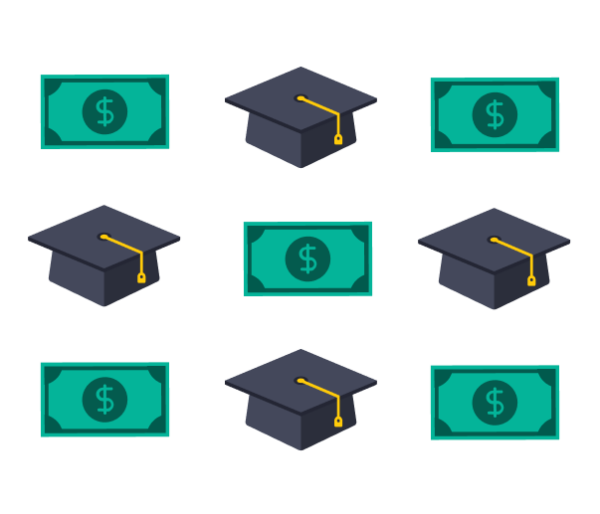Our goal is to give you the tools and confidence you need to improve your finances. Although we receive compensation from our partner lenders, whom we will always identify, all opinions are our own. Credible Operations, Inc. NMLS # 1681276, is referred to here as "Credible."
Student loan debt has become a common burden for Americans — one that spans age and cultural groups.
On average, graduates of four-year institutions leave school with $29,650 in debt, according to the National Center for Education Statistics (TICAS). Fewer than half of student loan borrowers manage to decrease their balances five years after beginning to repay their loans, a Pew Charitable Trusts-commissioned study found.
But student loans have also proven to be a valuable financial tool that has made the difference between getting a degree and not attending college for millions of people. And a college degree can be the difference between a well-paying career or a life of poverty.
If student loan debt is weighing you down financially or emotionally, keep these positive points in mind:
- You’re not alone
- It can be great for your credit score
- It doesn’t have to take forever
- You’re not stuck with your current terms
- You were able to go to college!
1. You’re not alone
Around 70% of college graduates have federal student loan debt, according to TICAS. The majority of student borrowers have less than $30,000 in loans at graduation and expect to pay them off in around 10 years. Everyone understands what you’re going through. For most people who earn a college degree, student loans are just a fact of life.
2. It can be great for your credit score
Your credit history will follow you for life. It can help determine what credit opportunities are available to you and what kind of interest rates you qualify for. People with no, or poor, credit history have trouble securing favorable interest rates and many don’t qualify for auto and home loans at all.
Luckily, paying down your student loans over time will help build a positive credit history, and raise your score. This can pay off in a big way by opening up borrowing opportunities and access to the lowest interest rates. That’s right. When you buy a house, you may be thanking your student loans for a lifetime of lower mortgage payments.
3. It doesn’t have to take forever
If paying off your loans as fast as possible is important to you, there’s no reason you can’t make it happen. Federal student loans start out with a 10-month Standard Repayment Plan. Stick to that plan and prioritize paying off your loans by minimizing living expenses, taking a second job, and making payments early before interest starts accruing. It takes hard work and smart budgeting, but it’s entirely possible to be debt-free before 25.
4. You’re not stuck with your current terms
Explosive growth in student loan refinancing, combined with low market rates, means you have a lot of options. If you’re not happy with the terms of your loan, shop around. Many qualified private lenders are ready to help you refinance and lower your payments. Nothing is set in stone, and you don’t need to be married to your original loan — especially when a rising credit score qualifies you for much better interest rates through a private lender.
5. You were able to go to college!
Your student loans weren’t for nothing: You got to go to college. College is the best time of many people’s lives. You made lasting memories, lifelong friends, and may have even met your spouse. On top of that, you increased your earning potential by a lot. A college degree increases in value every generation, and today’s college graduate earns an average of $1.2 million more over their careers than someone with only a high school diploma, according to a study by Georgetown University’s Center on Education and the Workforce.
Paying off student loans may seem daunting, but when you manage your loans effectively, they are more than worth it for many borrowers. Also, don’t forget that you have lots of options to help you manage and reduce your payments.
Further reading
- Student Loan Refinancing Lenders
- Best Companies for Student Loan Consolidation
- Income-Driven Repayment Plans
- How to Lower Your Interest Rate
- Student Loan Deferment & Forbearance Explained
- Student Loan Refinancing Calculator
- The Difference Between Fixed & Variable Rate Loans
- Student Loan Forgiveness Programs

We encourage you to provide honest and thorough feedback about your experience (not the experiences you’ve heard from other people), the good as well as the bad. But, we also want you to follow these content guidelines. The comments or responses that Credible posts under its official account are not provided, reviewed or endorsed by any of the financial institutions unless specifically stated otherwise in the response. Please keep in mind that the financial institution has no obligation to monitor any comments, questions or reviews you post and is therefore not responsible for ensuring your posts and/or questions are answered.